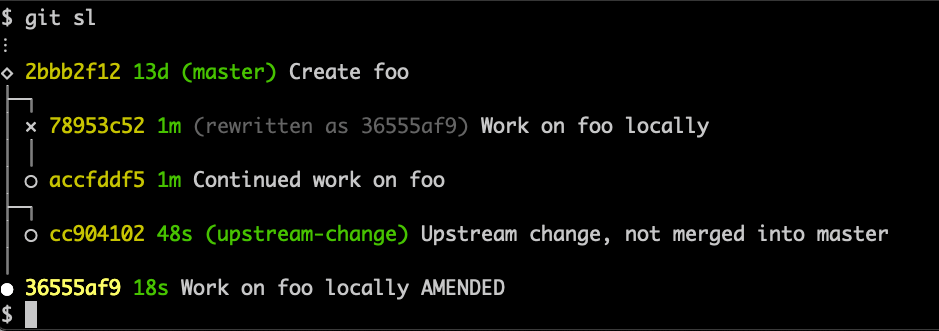5 releases (3 breaking)
| 0.10.0 | Oct 14, 2024 |
|---|---|
| 0.9.0 | May 27, 2024 |
| 0.8.0 | Aug 28, 2023 |
| 0.7.0 | Mar 2, 2023 |
| 0.7.0-rc.1 | Feb 19, 2023 |
#622 in Development tools
54 downloads per month
Used in 3 crates
785KB
17K
SLoC

Branchless workflow for Git
(This suite of tools is 100% compatible with branches. For more discussion, see this thread.)
▼ Jump to installation ▼
▼ Jump to table of contents ▼
About
git-branchless is a suite of tools which enhances Git in several ways:
It makes Git easier to use, both for novices and for power users. Examples:
git undo: a general-purpose undo command. See the blog post git undo: We can do better.- The smartlog: a convenient visualization tool.
git restack: to repair broken commit graphs.- Speculative merges: to avoid being caught off-guard by merge conflicts.
It adds more flexibility for power users. Examples:
- Patch-stack workflows: strong support for "patch-stack" workflows as used by the Linux and Git projects, as well as at many large tech companies. (This is how Git was "meant" to be used.)
- Prototyping and experimenting workflows: strong support for prototyping and experimental work via "divergent" development.
git sync: to rebase all local commit stacks and branches without having to check them out first.git move: The ability to move subtrees rather than "sticks" while cleaning up old branches, not touching the working copy, etc.- Anonymous branching: reduces the overhead of branching for experimental work.
- In-memory operations: to modify the commit graph without having to check out the commits in question.
git next/prev: to quickly jump between commits and branches in a commit stack.git sw -i/--interactive: to interactively select a commit to switch to.
It provides faster operations for large repositories and monorepos, particularly at large tech companies. Examples:
- See the blog post Lightning-fast rebases with git-move.
- Performance tested: benchmarked on torvalds/linux (1M+ commits) and mozilla/gecko-dev (700k+ commits).
- Operates in-memory: avoids touching the working copy by default (which can slow down
git statusor invalidate build artifacts). - Sparse indexes: uses a custom implementation of sparse indexes for fast commit and merge operations.
- Segmented changelog DAG: for efficient queries on the commit graph, such as merge-base calculation in O(log n) instead of O(n).
- Ahead-of-time compiled: written in an ahead-of-time compiled language with good runtime performance (Rust).
- Multithreading: distributes work across multiple CPU cores where appropriate.
- To my knowledge,
git-branchlessprovides the fastest implementation of rebase among Git tools and UIs, for the above reasons.
See also the User guide and Design goals.
Table of contents
Demos
Repair
Undo almost anything:
- Commits.
- Amended commits.
- Merges and rebases (e.g. if you resolved a conflict wrongly).
- Checkouts.
- Branch creations, updates, and deletions.
Why not git reflog?
git reflog is a tool to view the previous position of a single reference (like HEAD), which can be used to undo operations. But since it only tracks the position of a single reference, complicated operations like rebases can be tedious to reverse-engineer. git undo operates at a higher level of abstraction: the entire state of your repository.
git reflog also fundamentally can't be used to undo some rare operations, such as certain branch creations, updates, and deletions. See the architecture document for more details.
What doesn't git undo handle?
git undo relies on features in recent versions of Git to work properly. See the compatibility chart.
Currently, git undo can't undo the following. You can find the design document to handle some of these cases in issue #10.
- "Uncommitting" a commit by undoing the commit and restoring its changes to the working copy.
- In stock Git, this can be accomplished with
git reset HEAD^. - This scenario would be better implemented with a custom
git uncommitcommand instead. See issue #3.
- In stock Git, this can be accomplished with
- Undoing the staging or unstaging of files. This is tracked by issue #10 above.
- Undoing back into the middle of a conflict, such that
git statusshows a message likepath/to/file (both modified), so that you can resolve that specific conflict differently. This is tracked by issue #10 above.
Fundamentally, git undo is not intended to handle changes to untracked files.
Comparison to other Git undo tools
gitjk: Requires a shell alias. Only undoes most recent command. Only handles some Git operations (e.g. doesn't handle rebases).git-extras/git-undo: Only undoes commits at currentHEAD.git-annex undo: Only undoes the most recent change to a given file or directory.thefuck: Only undoes historical shell commands. Only handles some Git operations (e.g. doesn't handle rebases).
Visualize
Visualize your commit history with the smartlog (git sl):

Why not git log --graph?
git log --graph only shows commits which have branches attached with them. If you prefer to work without branches, then git log --graph won't work for you.
To support users who rewrite their commit graph extensively, git sl also points out commits which have been abandoned and need to be repaired (descendants of commits marked with rewritten as abcd1234). They can be automatically fixed up with git restack, or manually handled.
Manipulate
Edit your commit graph without fear:
Why not git rebase --interactive?
Interactive rebasing with git rebase --interactive is fully supported, but it has a couple of shortcomings:
git rebase --interactivecan only repair linear series of commits, not trees. If you modify a commit with multiple children, then you have to be sure to rebase all of the other children commits appropriately.- You have to commit to a plan of action before starting the rebase. For some use-cases, it can be easier to operate on individual commits at a time, rather than an entire series of commits all at once.
When you use git rebase --interactive with git-branchless, you will be prompted to repair your commit graph if you abandon any commits.
Installation
See https://github.com/arxanas/git-branchless/wiki/Installation.
Short version: check for packages in the repositories appropriate for your system or run cargo install --locked git-branchless. Once installed, run git branchless init in your repository.
Status
git-branchless is currently in alpha. Be prepared for breaking changes, as some of the workflows and architecture may change in the future. It's believed that there are no major bugs, but it has not yet been comprehensively battle-tested. You can see the known issues in the issue tracker.
git-branchless follows semantic versioning. New 0.x.y versions, and new major versions after reaching 1.0.0, may change the on-disk format in a backward-incompatible way.
To be notified about new versions, select Watch » Custom » Releases in Github's notifications menu at the top of the page. Or use GitPunch to deliver notifications by email.
Related tools
There's a lot of promising tooling developing in this space. See Related tools for more information.
Contributing
Thanks for your interest in contributing! If you'd like, I'm happy to set up a call to help you onboard.
For code contributions, check out the Runbook to understand how to set up a development workflow, and the Coding guidelines. You may also want to read the Architecture documentation.
For contributing documentation, see the Wiki style guide.
Contributors should abide by the Code of Conduct.
Dependencies
~78MB
~1.5M SLoC

